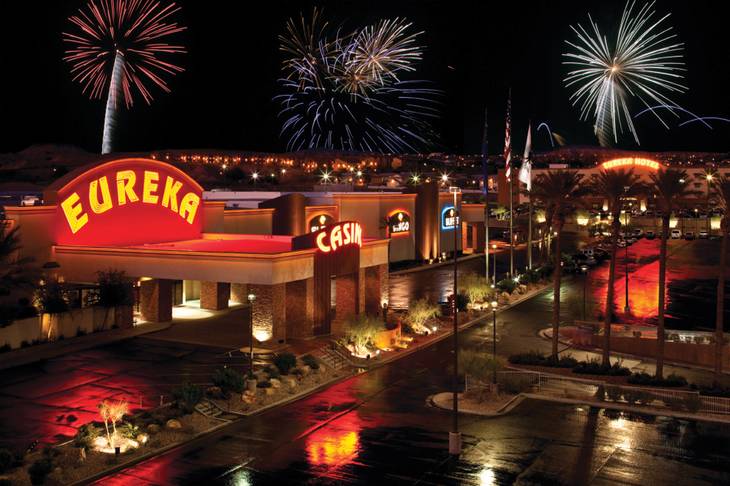
Gregory Lee

Andre Carrier
It’s not often the retirement benefits of a small-town casino attract the attention of Nevada gaming regulators.
But recent moves made by the Eureka in Mesquite are anything but normal for the gaming industry.
The Eureka received approval from the Nevada Gaming Commission in November to adopt an employee stock ownership plan, or an ESOP, which will act as a retirement plan for the casino’s 550 employees.
Employee ownership has not changed the way the casino is managed: Gregory Lee still is chairman and CEO, and Andre Carrier remains president and chief operating officer. The Lee family will retain a major financial interest in the company as well as its real estate.
But the family is giving a big financial stake in the casino to employees, who will use their part-ownership to earn retirement benefits.
It’s a complicated change and one that remains a relatively fresh concept to the gaming industry, particularly in Nevada. The Sunday recently spoke with Lee and Carrier to get a better sense of the ESOP and its potential implications.
The ESOP gives employees more of a financial stake in the casino than they would have had otherwise, correct?
Carrier: Employees in an ESOP don’t contribute their own money to receive the retirement benefit. So, unlike a 401(k) — where you’re taking some of your paycheck every week or every pay period and setting it aside for your retirement, and then you invest it and that investment inherently has risk — with an ESOP, there is no employee contribution. The company makes a contribution to a retirement trust in your name and, yes, it does increase or decrease based on the value of the company, but you never put your own money at risk.
Lee: Becoming an employee-owned company through an ESOP does not mean the company becomes a direct democracy. The company still is run by a board; how it was run before usually is how it is run afterward. And the employees, while they own stock, they really own it as beneficiaries of a trust.
Why did you go this route?
Lee: We saw an opportunity to strengthen the company, strengthen the employees and strengthen the community.
Mesquite went through a period of boom, and then our industry went through a period where most casino companies weren’t really growing anymore. Casino companies are investing in new areas where there was no gaming before, but the same store is not making more money than it did in 2007. When you’re growing, you invest a lot in your company, and you depreciate all that investment. As that depreciation burns off, you pay more taxes; your taxable income increases. From 2007, when we really expanded, to where we found ourselves, the industry had gotten a little bit mature. Our tax bill was taking off. And it was really starting to deprive the company of growth capital to invest.
An ESOP creates the potential for revitalization because all that money that a private company paid out in taxes by the owners now can stay in the company. When it’s owned by an ESOP, in a sense, it’s a retirement fund, not a business owned by the Lees. So what happens is, that money that was all leaving to go into the federal coffers can stay inside the company entity and be reinvested for the benefit of the fund.
We’re not unlike a lot of businesses, where 401(k)s are the primary way employees save. But it’s difficult to save your own money instead of making ends meet. An ESOP is different in that the company makes those payments for the employee, and those retirement funds have the potential to be worth more than what employees can do on their own in a 401(k). Our hope is that with the reinvestment in the company and people having a more meaningful retirement opportunity, they’ll choose to stay in Mesquite after they retire, and the community can be strengthened by having people stay, people who have better retirements, whose company is stronger.
How have Mesquite’s economy and business market fared? Has the city been more challenged than Las Vegas coming out of the recession?
Lee: I think it was more challenged because the economy was smaller and less diversified. And the industry changed.
In 2008, one of the biggest hotel-casinos in Mesquite closed, so we lost about 25 percent of our total visitation. We lost employees, we had people moving out, and that all happened at the same time as the real estate market was flatlining. It took us a lot of work just to stabilize our hotel-casinos, and now I think we’re coming out of it. Visitation is up. Gaming is actually flat, but it tells us that Mesquite needs new reasons to visit, new drivers.
Where do you see your business headed over the next couple of years?
Carrier: We want the company to continue to strengthen financially. That means having growth in revenue and improved operating profits. But the way — the how — is, aspirationally, we want to provide the guest-service and guest-interaction portions of our business, the product, as good or better than anyone in our industry. In the end, this is a personal business. People spend entertainment dollars with us because they feel as though they’re getting something of value in return.
We had long since started the culture of employee ownership before we created the ESOP. We are — and have always been — a family business. Interestingly for us then, having employee ownership in the form of an ESOP changes nothing. We were a family business before, we’re a family business after.
